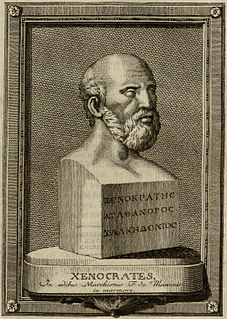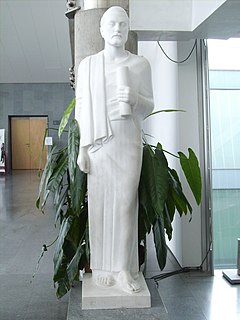| Look up Xenocrates in Wiktionary, the free dictionary. |
Xenocrates is a Chalcedon (4th century BC) philosopher.

Xenocrates of Chalcedon was a Greek philosopher, mathematician, and leader (scholarch) of the Platonic Academy from 339/8 to 314/3 BC. His teachings followed those of Plato, which he attempted to define more closely, often with mathematical elements. He distinguished three forms of being: the sensible, the intelligible, and a third compounded of the two, to which correspond respectively, sense, intellect and opinion. He considered unity and duality to be gods which rule the universe, and the soul a self-moving number. God pervades all things, and there are daemonical powers, intermediate between the divine and the mortal, which consist in conditions of the soul. He held that mathematical objects and the Platonic Ideas are identical, unlike Plato who distinguished them. In ethics, he taught that virtue produces happiness, but external goods can minister to it and enable it to effect its purpose.
Xenocrates or Xenokrates is also the name of:
- Xenokrates of Sicyon (3rd century BC), writer and sculptor
- Xenocrates of Aphrodisias (1st century AD), physician
Xenokrates of Athens or of Sicyon was an ancient Greek sculptor and writer, and one of the world's first art historians. Three signed statue bases are all that survive of his work. Pliny the Elder described him as a pupil of either Euthykrates or Teisikrates, and states that he surpassed both in his career, and that he wrote several volumes concerning his craft. Pliny the Elder's entire dissertation on the history of sculpture and painting is believed to have been strongly influenced by the work of Xenokrates. He was the art critic most familiar to the Romans of the late Republic, and he greatly influenced their tastes.
Xenocrates a Greek physician of Aphrodisias in Cilicia, who must have lived about the middle of the 1st century, as he was probably a contemporary of Andromachus the Younger. Galen says that he lived in the second generation before himself. He wrote some pharmaceutical works, and is blamed by Galen for making use of disgusting remedies, for instance, human brains, flesh, liver, urine, excrement, etc. One of his works was entitled On Useful Things from Living Beings. He is several times quoted by Galen, and also by Clement of Alexandria; Artemidorus; Pliny; Oribasius; Aëtius; and Alexander of Tralles. Besides some short fragments of his writings there is extant a synopsis of a work on marine creatures, preserved by Oribasius.
| This disambiguation page lists articles about people with the same name. If an internal link led you here, you may wish to change the link to point directly to the intended article. |






